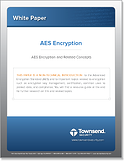AES Encryption & Related Concepts |
It seems like every day the media reports another data breach—a stolen laptop that contains patients’ private information, credit cardholders’ names and social security numbers hacked. Not only do the headlines prove to be public relations nightmares for the companies involved—especially if the stolen or hacked data isn’t encrypted—but they come with severe financial penalties, often reaching into millions of dollars.
When data is encrypted, companies can assure those whose data has been stolen or hacked that there is no reason to worry. Thieves may have the files containing the data, but the thief will be unable to access the data itself. This minimizes the public relations hit and reduces liability with compliance regulators. In today’s highly regulated business world, there is no excuse for not having encryption on your IBM i. Here are two types of encryption to make sure your data is secure:
NIST-Certified AES Encryption for Data at Rest
NIST sets non-military government standards for a wide variety of technologies including data encryption. Because NIST uses an open and professional process to establish standards, the private sector usually adopts NIST standards for commercial use. NIST is one of the most trusted sources for technology standards.
Since AES was introduced, it has been adopted by all U.S. government agencies as the gold standard for protecting sensitive data, and many software companies have made it available to consumers through encryption software. When selecting a data security service, looking for one that has NIST certification should be at the top of your list.
PGP Encryption for Data in Motion
In today’s world, data moves faster and further than ever. That’s why it’s important to ensure it’s secure whether it’s in a database, on a laptop, or sent via email.
PGP encryption is ideal for exchanging data with trading partners, banks, insurance companies, benefits providers, and many other external partners. It’s ability to run on any computing platform makes it ideal for this type of secure data exchange.
Data breaches and associated fines don't have to be a reality of doing business. By properly encrypting your sensitive information you remove the risk of seeing your name in the headlines, being fined millions of dollars, and trust of your brand by your customers. Download our white paper "AES Encryption and Related Concepts" to learn more about industry best practices for securing your data.


